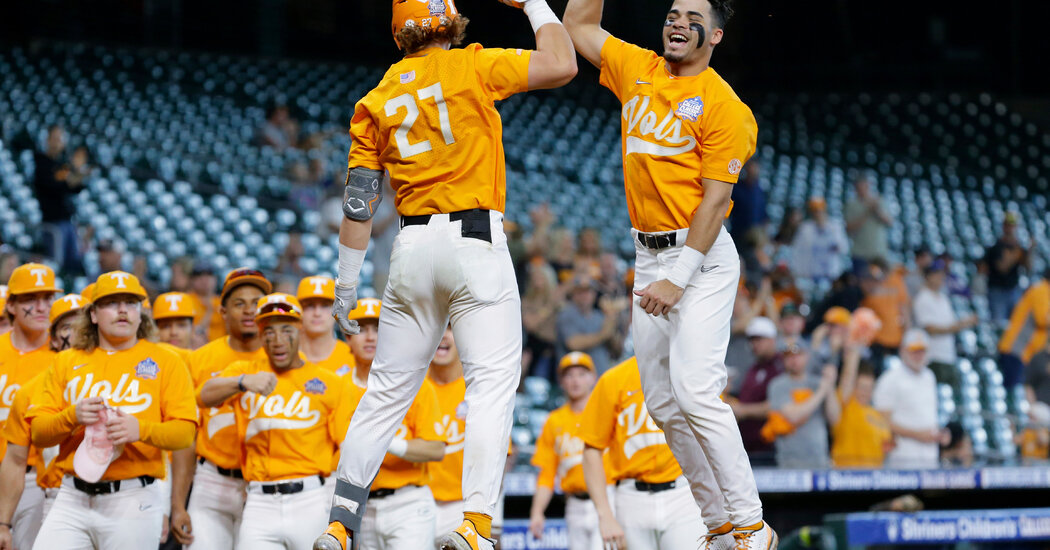
With the seasons coming to a conclusion, two teams stand at the top of the college baseball and softball worlds, far, far above their rivals.
In baseball, Tennessee is the favorite to win the College World Series after a 53-7 season. In softball, it’s Oklahoma, at a scarcely believable 54-2.
Tennessee has put up its impressive record and gained the No. 1 ranking while playing in the tough Southeastern Conference, which has nine teams in the tournament, including three other top 16 seeds. Tennessee ended that tough slate with a 25-5 conference record, then won four straight to take the SEC tournament.
Drew Gilbert hit .385 this season, and Trey Lipscomb had a slugging percentage of .737 with 21 homers. But Tennessee’s entire lineup can hurt you. Eight players reached double-digit homers this season despite only 150 to 200 at-bats for most of them. The team’s slugging percentage was .604, best in Division I, and it ranked fourth in on-base average.
But as great as the hitters are, the main problem for opponents is that Tennessee is extremely difficult to hit against. The five main starters posted E.R.A.s from 1.67 to 2.61 and allowed batting averages from .159 to .213. The staff led Division I with a 2.35 E.R.A., and no other team was below 3.00.
Three players are expected to go in the first round of Major League Baseball’s 2022 draft: Gilbert; Jordan Beck, another outfielder; and pitcher Blade Tidwell, despite his missing much of the season with an injury.
But despite the Volunteers’ dominance this season, they cannot be considered a sure thing. The College World Series is notoriously difficult to win. While the double-elimination preliminaries tend not to be that difficult for the top seeds, the best-of-three “super regional” that follows is generally against a tough opponent. And the actual eight-team World Series normally requires wins over several top-five or top-10 teams to win the title.
As a result, top seeds have regularly fallen over the years. Indeed, Miami in 1999 was the last No. 1 to win. In the 20 tournaments since then, three No. 2s and three No. 3s have won, but top eight seeds have won just nine times, compared with 11 teams not in the top eight.
And Tennessee is hardly a traditionally dominant college baseball power. Although the Volunteers made the College World Series last season, finishing tied for seventh, they had a losing record in the SEC every season from 2006 to 2019. Their best finish in the World Series was runner-up in 1951.
So though they are favored by oddsmakers, they are not an extremely short price. They currently stand at only 5-2 (next best are No. 3 Oregon State at 9-1 and No. 2 Stanford and No. 4 Virginia Tech at 12-1).
To buck that history, Tennessee will first have to win a group that includes Georgia Tech, Campbell and Alabama State, starting Friday at home, then beat potentially No. 16 Georgia Southern next week to make the World Series in Omaha starting June 17. Then it is likely to face a gantlet of strong teams that could include most or all of the other favorites.
Oklahoma Seeks a Repeat in Softball
College softball also has a dominant team this season. If anything, it is clobbering its rivals by even more.
Oklahoma has put up a staggering 54-2 record, including a 17-1 Big 12 regular season and five straight wins in the N.C.A.A. tournament, to qualify for the eight-team World Series in Oklahoma City starting Thursday.
Its two losses came against Texas in the regular season and Oklahoma State in the SEC tournament by the scores of 4-2 and 4-3. In contrast, its wins include plenty of scores like 21-0, 19-0 and 15-1. Those margins would undoubtedly be far greater without softball’s mercy rule, which stops a game after five innings if one team is up by at least eight runs.
Daunting for possible opponents is that in all likelihood they will need to beat the Sooners twice to eliminate them. In the earlier rounds, Texas A&M managed a close loss, 3-2, to Oklahoma. The rematch finished, 20-0.
Oklahoma is led by Jocelyn Alo, the back-to-back college player of the year, who has hit more career home runs than any other player in Division I history. She has 29 homers this year and is hitting .497 (both second in the nation) and slugging 1.163. She is not the only threat: Tiare Jennings has 24 homers and Grace Lyons 21. The team hit .369, best in the nation.
And good luck getting runs against them. Hope Trautwein is 18-1 with a national-best 0.40 E.R.A. How does one post such an impressive number? In short, just throw 104⅓ innings while giving up only six runs.
Jordy Bahl, the national freshman of the year, is 21-1 with a 0.95 E.R.A. Think the third starter will give you a chance for a win? Nicole May is 15-0, with a 0.99 E.R.A.
And history is much kinder to top seeds in the Women’s College World Series. The No. 1 won in four of the last 10 years, including last season’s No. 1: Who else but Oklahoma?
But in that World Series, Oklahoma lost its opener to unseeded James Madison, 4-3, in eight innings: a ray of hope for those having nightmares about Trautwein fastballs and Alo bombs.